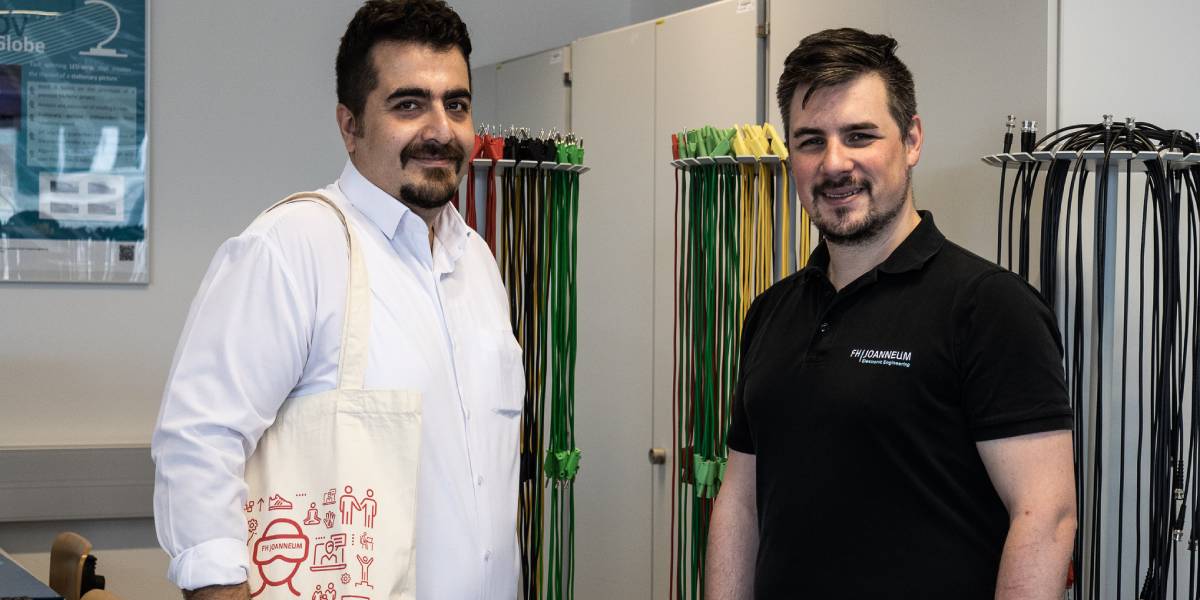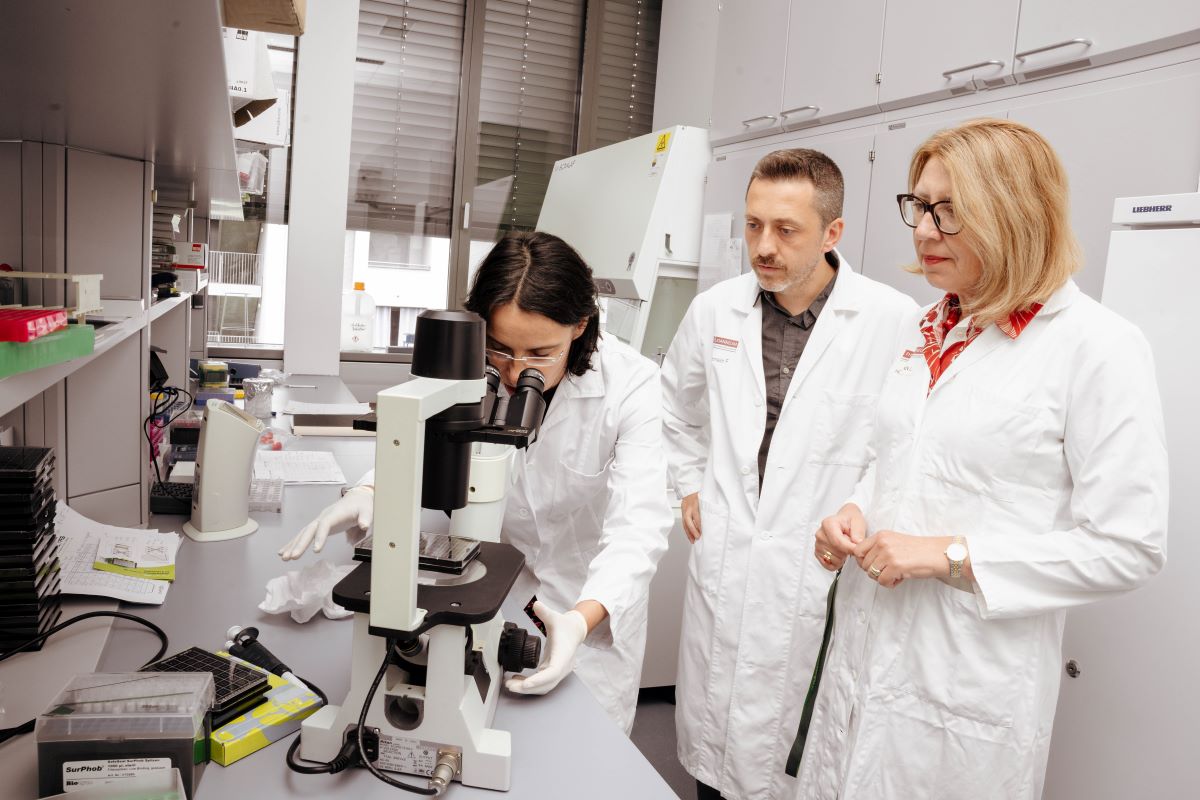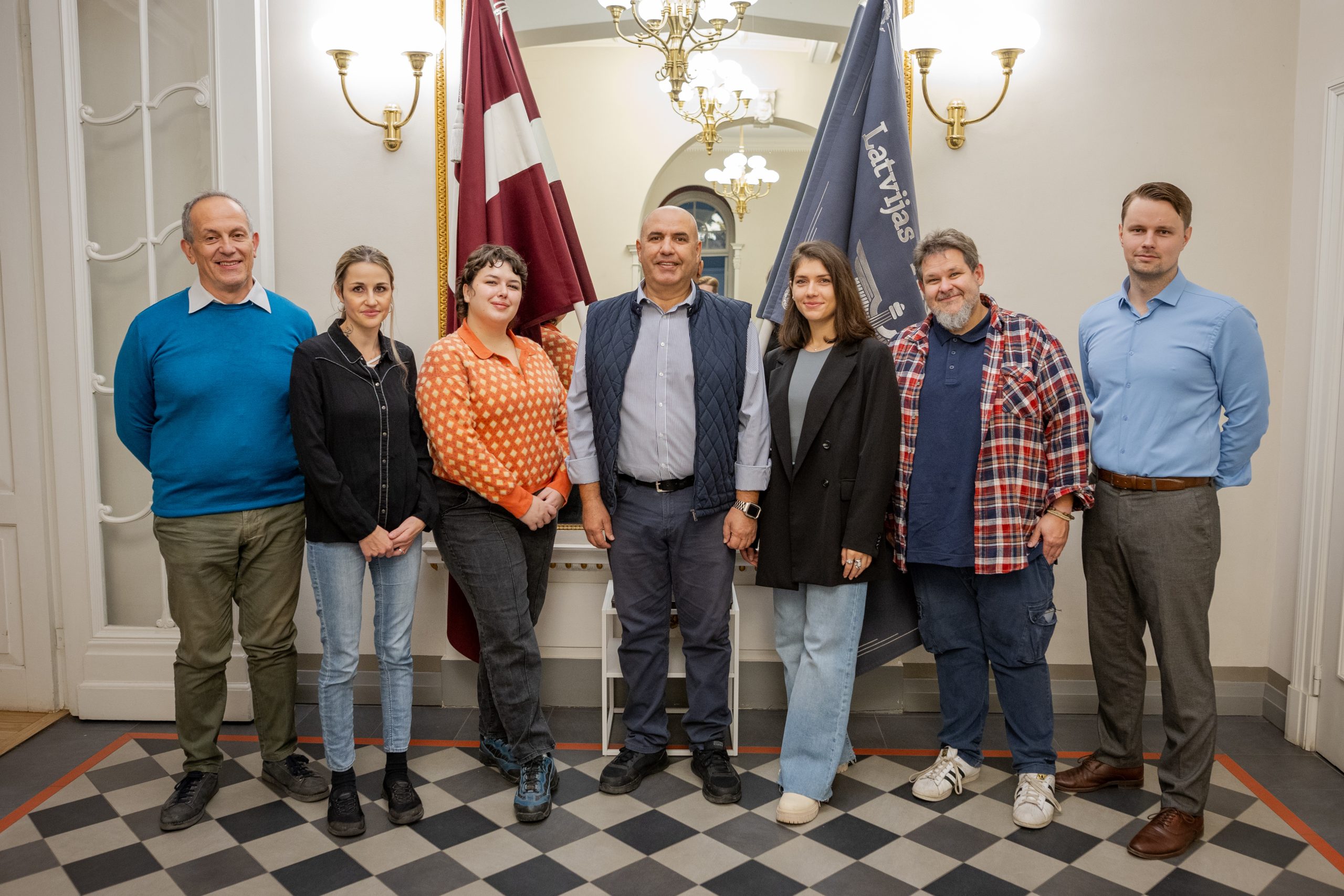Sayyidshahab Nabavi and Florian Mayer are two doctoral students from FH JOANNEUM who have been selected for the new cooperative doctoral programme with TU Graz “Dependable ElectroNIc Based SystEms”, or DENISE for short. We asked the passionate electronics engineers for an interview.
Welcome to DENISE!
Mag. Marion Velik, 01. June 2022
Sayyidshahab Nabavi and Florian Mayer. Photo: FH JOANNEUM / Salchenegger-Niamir
There was great joy at FH JOANNEUM and TU Graz when it was announced that DENISE would receive one million euros in funding from the Austrian Science Fund (FWF) via their “doc.funds.connect” funding scheme. DENISE provides cross-university training for five doctoral students in the field of electronics-based systems (EBS). Research is being conducted into concepts and methods, but also into application-oriented tools to make electronics-based systems (EBS) more reliable. The call for applications from FH JOANNEUM and TU Graz for the four-year doctoral programme was issued internationally. Florian Mayer and Sayyidshahab Nabavi recently started their work at the Institute of Electronic Engineering at FH JOANNEUM.
What was your personal motivation for applying for a PhD position at DENISE?
Sayyidshahab Nabavi: “I chose the program because I am interested in research works. I started researching in 2015 while I was doing my master’s. The Denise Program gives me the opportunity to work on sensor networks and use optimization approaches in a practical way. Also, after graduation, there are many high-tech companies in Graz. Therefore, there will be numerous job opportunities here.”
Florian Mayer: “Doing independent scientific research in a specific area of signal processing has always appealed to me, so I really appreciate the opportunity to start the doctoral programme. From my own experience, I know that such a goal holds many challenges, is demanding and can require a lot from you. However, gaining new knowledge and sharing it with others has a special appeal for me.”
What will you be working on at DENISE? What is your focus?
Florian Mayer: “’Reliable 1-bit mixed-signal processing’ aims to display and process complex information with one bit. A bit ‘binary digit’ is the smallest binary information unit and is often represented with ‘0’ or ‘1’ (two-level). This leads to the questions of whether we can find uniform representations for 1-bit signals (either continuous-time or discrete-time), whether we can build reliable systems for detecting and generating 1-bit signals, and whether we can develop algorithms for 1-bit signals and systems. If this approach works, we can use digital circuit technologies to develop highly efficiently digital, analogue and mixed-signal circuits.”
Sayyidshahab Nabavi: “The Project engages a robust sensor network that should be resistant to node failures and network changes. Also, optimization approaches are applied considering different goals in sensor network design.”
How will electronically based systems affect our daily lives in the future?
Florian Mayer: “The use of electronics usually only becomes apparent when it is faulty or damaged. Until then, electronically based systems (EBS) work unnoticed in the background, performing their predefined limited or universal tasks. Without their functions, many everyday applications would simply not be feasible (even now). In the future, the question will rather be, ‘How can we as users interact more strongly with EBS? How can we make them more powerful, reliable and secure?’ These are certainly questions that will keep us busy during the DENISE project.”
Sayyidshahab Nabavi: “A contemporary smart house is equipped with several functionalities that enhance the home’s comfort and save time and money. EBS plays a significant role in our daily life by making it more comfortable, saving costs and protecting the environment.”
What are you looking forward to in your PhD programme?
Sayyidshahab Nabavi: “I think the DENISE program is an excellent program that brings theoretical and practical research together. I am going to enjoy the valuable experience of professors of both institutions.”
Florian Mayer: “I am looking forward to meeting many nice, smart and inspiring people during this time and I know that my environment (family and colleagues) will also provide me with the necessary and precious support. I am also looking forward to exchanges with my fellow PhD candidates within the project.”
Thank you very much for the interview!
Sayyidshahab Nabavi completed his Bachelor’s and Master’s degree in “Software Computer Engineering” at the Urmia University of Technology in Iran.
Florian Mayer has been studying the “Electronics and Computer Engineering” degree programme at FH JOANNEUM since 2016. His previous activities included teaching as well as research and development of corporate projects.
The DENISE programme is funded by the Austrian Science Fund FWF through the “doc.funds.connect” funding scheme with one million euros each. The goals of the funding initiated by the Federal Ministry of Education, Science and Research (BMBWF): It aims to accelerate cooperation between institutions, strengthen the research competence of universities of applied sciences and open up further career opportunities for young scientists in highly innovative research fields.










